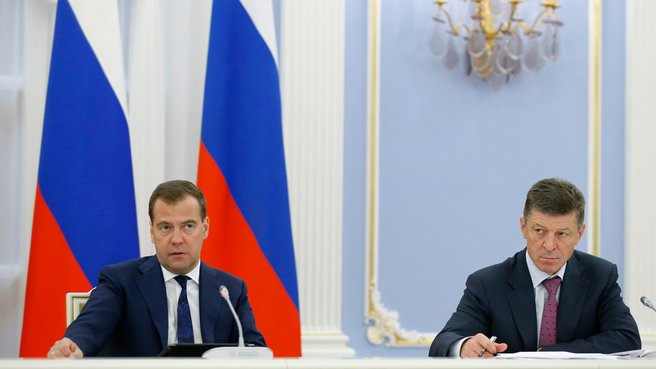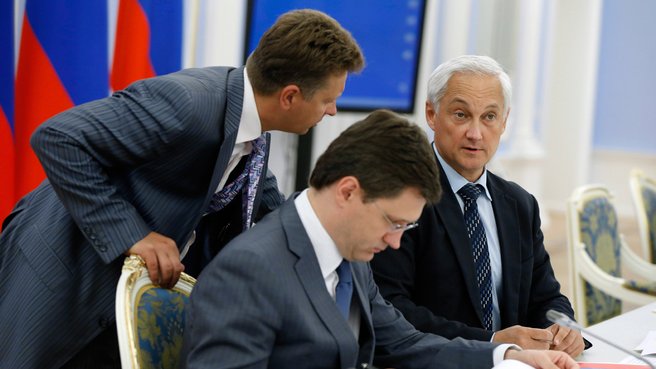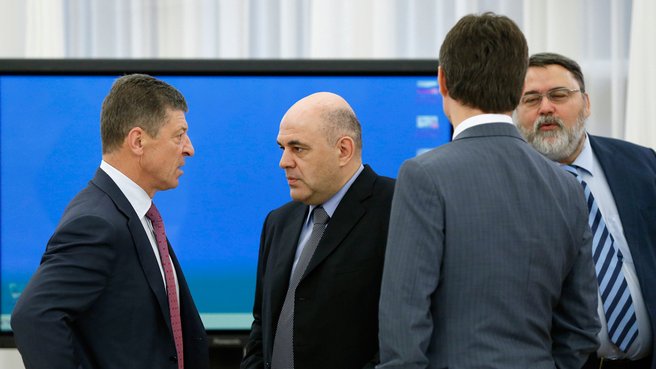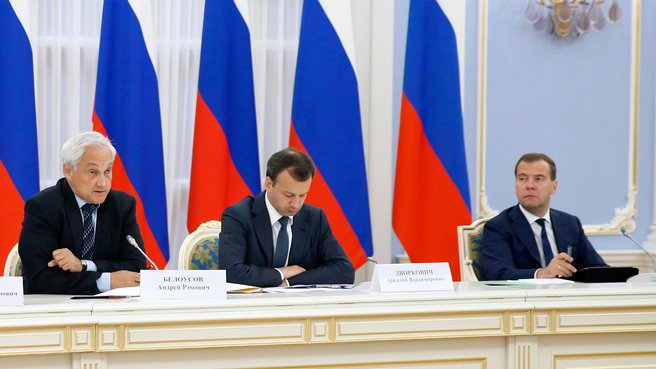Transcript:
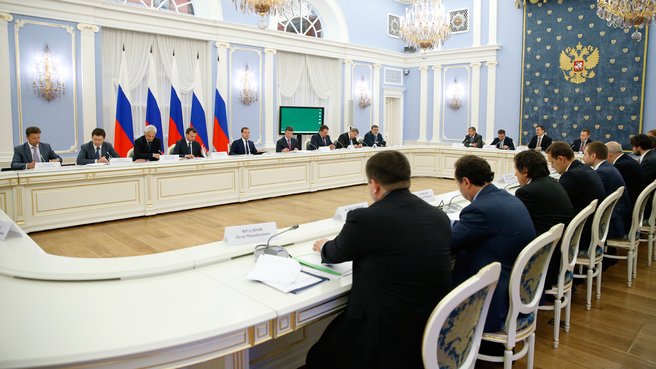
Meeting on the drafting and implementation of the National Business Initiative’s road maps for Improving the Investment Climate
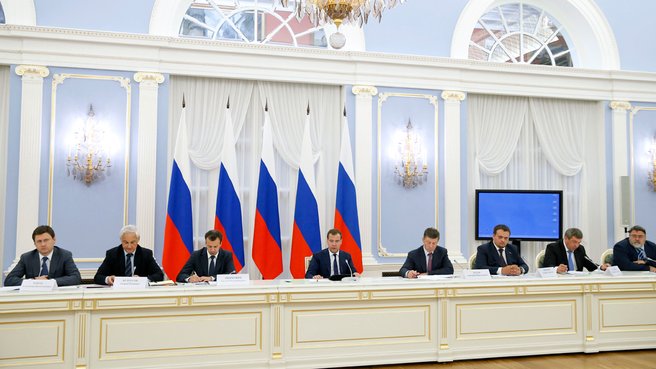
Meeting on the drafting and implementation of the National Business Initiative’s road maps for Improving the Investment Climate
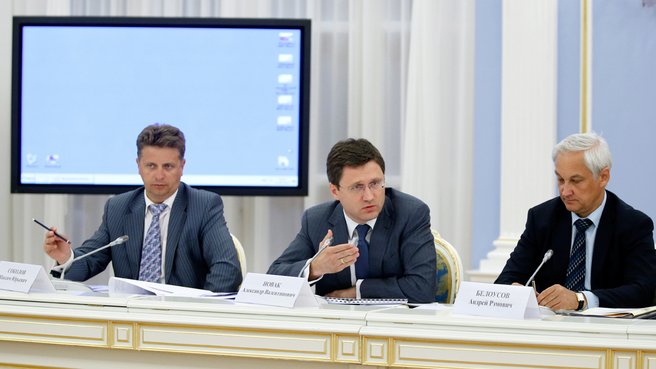
Minister of Transport Maxim Sokolov, Minister of Energy Alexander Novak and Minister of Economic Development Andrei Belousov
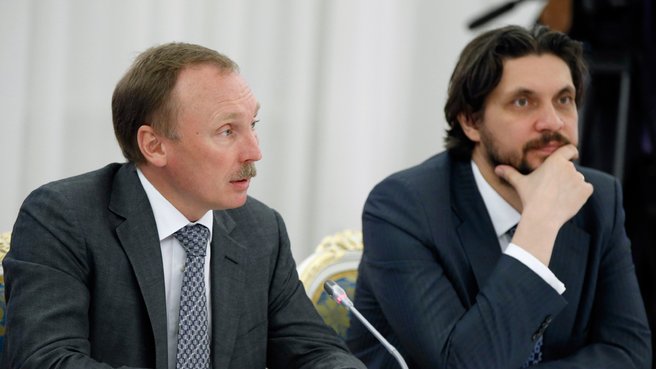
Siberian Generating Company General Director Sergei Mironosetsky and Delovaya Rossiya Vice President Alexander Osipov
Meeting on the drafting and implementation of the National Business Initiative’s road maps for Improving the Investment Climate
Dmitry Medvedev: Colleagues, we have met today to discuss the implementation of the National Business Initiative and road maps, which have already been approved. As usual, we are talking about the business community’s proposals to improve Russian legislation, including customs, tax and property-rights protection legislation. And legislation on the accessibility of the energy infrastructure has been added today.
First, I would like to say that I have just approved the ninth road map, which seeks to improve the quality of the regulatory environment. Of course, the main goal and the essence of this road map is to simplify and to expedite various proceedings. In the long run, this influences everything, including Russia’s ratings.
I would like to remind you that the work under the National Business Initiative was launched over a year ago in February 2012. It took almost 12 months to approve the first working road maps. This time period is sufficient to sum up some brief results and to talk about the future.
On the whole, most entrepreneurs with whom I have talked and who are the main communicators on this issue say that the efforts have brought certain results. Today, our colleagues, including the Minister of Economic Development and the Head of the Strategic Initiatives Agency, will discuss this issue in greater detail. However, I will, nevertheless, name several positions. For instance, preliminary notification has been introduced in the customs sphere. On the whole, this has made it possible to reduce the duration of customs-clearance proceedings, especially at traffic checkpoints.
Power-network connection deadlines have been shortened by 30 days. We have expanded the list of privileged companies and individuals who can pay electricity bills under three-year lay-away plans.
D.Medvedev: "I have just approved the ninth road map, which seeks to improve the quality of the regulatory environment. Of course, the main goal and the essence of this road map is to simplify and to expedite various proceedings. In the long run, this influences everything, including Russia’s ratings."
At the same time, our estimates, which probably coincide with those of the business community, show that the number of measures that have been implemented does not meet our expectations. We have implemented roughly 50% of the essential measures, and we have so far failed to approve an exhaustive list of administrative proceedings, which must be changed in the area of housing and industrial construction. The introduction of the so-called notifying procedures is simply being delayed in some cases.
The allocation of land plots for building energy-infrastructure facilities remains topical. Some decisions that are expected by the business community have not yet been adopted. Thus, I would like to hear why this is happening today, and what action we plan to take.
And now I would like to say a few words about subsequent steps. First, the State Duma has shelved some of our draft laws. We need to rectify this situation together with our colleagues from the Federal Assembly. I would like to remind you that the State Duma is examining about five legislative packages on the construction industry, property, energy and customs issues. We must adopt decisions on these issues more quickly.
D.Medvedev: "For instance, preliminary notification has been introduced in the customs sphere. On the whole, this has made it possible to reduce the duration of customs-clearance proceedings, especially at traffic checkpoints."
We need feedback to be able to determine what we need to do, and we also need to monitor progress and changes in working conditions. The results of such analysis should be as open to the public as possible. The last time we discussed this was at the Krasnoyarsk forum; it was a useful discussion following which the necessary instructions were issued. Currently, all new road maps are also being coordinated in the final stage with the Agency for Strategic Initiatives Agency.
The Ministry of Economic Development is nearly done organising the monitoring of road maps, including online. On May 16, we launched инвестклимат.рф, a specialised website for monitoring efforts to improve the investment climate.
One more issue, which we have discussed before, concerns the development of a mechanism for adjusting road maps according to their progress, the results they achieve and their failures. We must not be embarrassed (about failures). I believe that we should above all rely on the opinion of our business and expert communities, as well as our international commitments, in particular in the framework of the Common Economic Space and the World Trade Organisation. We should approve new measures when necessary and accept new proposals on adjusting existing road maps. Of course, our colleagues in the Government, in particular the deputy prime minister in charge of the given areas and the Government staff as a whole, should assume responsibility for coordinating this work in all areas.
D.Medvedev: "Power-network connection deadlines have been shortened by 30 days. We have expanded the list of privileged companies and individuals who can pay electricity bills under three-year lay-away plans."
Let’s now discuss our achievements and, most importantly, where we’ve failed to meet our goals. I turn the floor over to Minister of Economic Development Andrei Belousov.
Andrei Belousov: Thank you, Mr Medvedev. Colleagues, my first point is that the nine roadmaps which now have the status of Government resolutions cover almost all the weaknesses and shortcomings of the business environment in Russia. The Strategic Initiatives Agency is in the process of putting together several more road maps, but I believe that they are complementary in nature. The existing nine road maps address all the issues involved in Russia’s joining the leading countries in terms of the quality of the business environment.
Some figures, if I may. These nine road maps include around 520 actions. Of them, 126 should have already been implemented. These numbers are shown in the slides and the handouts, so feel free to use them. To date, 58 out of 126 actions have been carried out, while 39 haven’t. For 29 actions, the department has formally completed its work, but has not approved the requisite legal act, so there’s no way to assess the result of the implementation of such a legal act. If we complete all the activities mentioned in nine road maps this year, we could move up in the Doing Business ranking from our current spot of 112th to about 50th. That would be a leap forward (this does not account for changes in the rankings for other countries), but this can happen only if we achieve all the goals in these road maps.
Andrei Belousov: "The existing nine road maps address all the issues involved in Russia’s joining the leading countries in terms of the quality of the business environment."
What are the results? I won’t talk about specific results, because heads of working groups will be speaking later and, I believe, they will cover this issue. I'll mention two systemic results. The first one was noted by a group of experts from the World Bank mission who was in Moscow in the spring for another round of evaluations of Russia for the Doing Business ranking. According to their evaluations, there had been about 10 people in Russia in recent years who were involved in improving the business climate in Russia. Today, and I quote, there are “hundreds of people” doing this work, which has for the first time become systemic. Almost all departments and business organisations are involved in this work. That, in my opinion, is a very important result. We need to use this synergy and not let it go to waste. The second achievement is that the regions, primarily Moscow, are now also involved in this work. Two years ago, when we were performing subnational studies in 30 key Russian regions in conjunction with the World Bank using the Doing Business methodology, Moscow ranked 30th out of 30 regions. Today, a newly created special headquarters has taken stock of all administrative procedures in the sphere of construction and grid connections and evaluated all the corresponding documents. They haven’t just taken stock of these things, but also held a special meeting of the Moscow Government which summed up the results of this work.
The Moscow Government resolved to advise municipalities, prefectures and district councils against approving any acts other than those that were registered with the Moscow Government. This information was brought to the attention of the investors and the companies that are being connected to the grids. I can show you the three-page flyers on grid connections published by the Moscow United Electric Grid in conjunction with the Moscow Government. It’s titled Five Steps in Three Visits, or the similarly titled flyer about grid connection of up to 15 kW broken down for different consumer groups. They have published similar materials with regard to the construction business.
Andrei Belousov: We believe that each road map should be reviewed at a Government meeting yearly, both in terms of performance and in terms of necessary adjustments.
As a result, the number of procedures for a base facility (usually, a logistics centre) has been reduced from 42 to 10, the time went from 344 days to 103. The number of procedures to get access to the electricity grids was reduced from 10 to 4; the number of days it takes to get connected was down from 281 to 146. On the one hand, this is indicative of Moscow’s energetic approach to these issues. On the other hand, it is indicative of the enormous capacity that we have in these areas that we need to regulate at the federal level and then use in other regions. Moscow has become a pilot ground for us to work together with the SIA on improving the business environment in Russia.
There are problems, however. I will not elaborate on specific problems of individual road maps. I’d rather discuss systemic issues. By and large, we are faced with three problems today.
Andrei Belousov: A group of experts from the World Bank mission who was in Moscow in the spring for another round of evaluations of Russia for the Doing Business ranking. According to their evaluations, there had been about 10 people in Russia in recent years who were involved in improving the business climate in Russia. Today, and I quote, there are “hundreds of people” doing this work, which has for the first time become systemic. Almost all departments and business organisations are involved in this work. That, in my opinion, is a very important result.
I’m sorry for the truism, but the first problem is low executive discipline. There’s a slightly less commonplace aspect to it: based on the rules that govern the operation of federal executive bodies, the implementation of the road map is not monitored by the Government Executive Office. As a result, many road map documents (again, this is a system-wide problem), materials and regulations are stuck forever at the ministries or the Ministry of Justice (although the latter has made a major effort to fix the problem) or at the Government Executive Office. Therefore, we have an inordinately high... I have mentioned this number earlier: 29 of the 126 actions are being implemented. Documents pertaining to these 29 actions are stuck either in the Duma or in the Executive Office.
We propose changing this system dramatically and establishing a special procedure for monitoring the implementation of activities under the road map. Ministries update us about the state of affairs. In conjunction with the SIA and the Leaders’ Club, we have deployed a monitoring system. However, if the system is not overseen by the Government Executive Office, it will not work. So the first item on the agenda is to introduce special oversight.
Second, we believe that each road map should be overseen by a department similarly to what we have in the federal targeted programmes. This does not mean that a department should do all the work, that’s not the point. For example, a large portion of the road map for customs administration is actually the responsibility of the Ministry of Transport, because containers tend to get stuck when they are ready to be shipped from the port. We know this for a fact, because we travelled to St Petersburg's port and saw for ourselves that everything gets stuck there: the customs did their part of the work, but the containers weren’t shipped. We have similar questions for Rosselkhoznadzor, which operates on the customs border.
There must be a single body that oversees and monitors everything and is responsible for everything. We believe that the Federal Customs Service should be in charge of this. Similarly, there are many issues involved in connecting to electricity grids, and we believe that the Ministry of Energy should be responsible for the whole thing. The same applies to all other road maps: the Ministry of Economic Development should be in charge of exports, the Federal Antimonopoly Service or the Ministry of Economic Development should oversee the competition, and so on. We have such action entities for all maps, and this the way it should be.
Third, we believe that (I will talk later about the second issue) each road map should be reviewed at a Government meeting yearly, both in terms of performance and in terms of necessary adjustments. Adjustments are the second problem that we have encountered. Our road maps are designed as travelling waves, that is, the benchmarks go until 2018, and action officials can measure their progress by years (it used to be 2012-2015, but we have recently decided to go by years – 2013, 2014, and 2015). Moreover, we also use these benchmarks as KPIs for heads of federal executive bodies. The actions are designed in such a way that anywhere from 70% to 80% of them get implemented within 12-18 months. So from the outset we are introducing a mechanism to adjust road maps.
After a year and a half we will sum up the results – what has been done and what hasn’t, and make a new edition of the map, guided by the targets we are supposed to hit. This is standard practice of project management, and it used in many companies. We didn’t invent it and neither did BCG (The Boston Consulting Group), who helped us to implement all this.
But what usually happens? When we start making corrections, the ministries and the business community see things differently, they even disagree on the adjustment process and the results of adjustments. We have now compiled two full road maps that need a complete revision since most of the measures…The deadlines are passed, some things has been partially done. This a map for power grid connection and the construction map. Mr Kozak (Dmitry Kozak, Deputy Prime Minister) can tell you how difficult it was to develop the road map on regulations in construction. By the way, it hasn’t been submitted to the Government, yet unlike the electric power road map, which the Government has had for a fortnight, as far as I know.
What do we need in order to rectify this system-wide problem? We have to issue a unified regulation on adjusting road maps, bearing in mind that it is a long-term job that will be ongoing till 2018. We are ready to take it on, and the draft protocol reflects this.
Andrei Belousov: "We have now set out to create focus groups, a pool of respondents from the businesses affected by each of the road maps, representing about 100-150 companies – these are pure businesses that operate in the field, so to speak."
The third problem I’d like to stress is related to monitoring. The topic seems simple enough – to monitor the road map. But right from the start we encountered a problem: the federal executive bodies responsible for a certain measure and businesses have a totally different view on results. The federal executive bodies, as a rule, think the result is achieved when a legislative act is submitted to the Government or to the State Duma at best, whereas businesses see that something should change in how they run their operations, that is, changes on the ground. Undoubtedly, businesses are right, but for the system to start operating we need to clearly determine what should be monitored, who should do the monitoring, and the relevant procedures. To answer the question “what should be monitored”, we are now adding to all road maps the clearly defined result of each road map as viewed by business. It’s a very painful adjustment, some agencies are resisting it, but we should finish this work, and I am asking the Prime Minister for his support in this matter.
Who does the monitoring? It’s also a very complicated matter because when we say that business should do the monitoring, we have to understand what sort of business it is. Not all businesses take part in construction or deal with connecting to power grids. We have now set out to create focus groups, a pool of respondents from the businesses affected by each of the road maps, representing about 100-150 companies – these are pure businesses that operate in the field, so to speak. The work was done together with federal executive bodies, business associations, and, of course, the Strategic Initiatives Agency. These groups have been set up now, and we will get some feedback, a response (first of all by explaining to the pool participants what we want, and what we are actually doing): this happened, this didn’t happen, the climate has changed or hasn’t. We’ll do this with the help of leading sociological organisations that will devise the techniques involved. The process should also be described, and we are planning to describe it within the framework of an additional agreement – there is an agreement, an additional agreement between the Ministry of Economic Development and the Strategic Initiative Agency, which will contain the whole procedure.
Generally speaking, if you want to hear my opinion, I’d say that the picture is very different for different road maps, but I absolutely support what Mr Medvedev has said: the work has already began, and there is a feeling within the business community that some results are already noticeable. Although I should note, expectations have so far exceeded what has actually been done.
Dmitry Medvedev: Thank you, Mr Belousov, for that detailed account of where we stand. Let me briefly comment on what you’ve said.
I am ready to back measures on improving supervision of the implementation of the road maps, including by introducing a special performance monitoring system both at the Government Executive Office level and in other areas if need be. Let’s just figure out how to best organise this. I also see nothing bad in assigning an agency to each road map because, one way or another, those maps still fall within the competence of several agencies, with one of them being the key, or main agency. We can discuss maps and map-implementation results at Government meetings. But I think it would be more useful to discuss them at meetings that involve a more or less broad contingent of business persons, rather than Government meetings. This would ensure the feedback you're talking about, and people would respond directly to what we have accomplished or failed to accomplish. Of course, this discussion would be more formal at Government meetings.
I have seen the presentation. I was somewhat surprised with regard to one rather specific aspect. Here, we can see various map slides showing the implementation process, but I have some misgivings about this red circle. It is all right that some objectives have not been accomplished, I understand this. But I am somewhat concerned about various aspects that are not supported by the business community. If we say that these “road maps” are being drafted precisely for the business community, under the National Entrepreneurial Initiative, then I don’t quite understand why they don’t support our projects which are being implemented. I understand that business-community representatives have different stances, and that you cannot please everyone, but we should think hard about whether any specific initiative that is not supported by the entire business community is correct or not.
Andrei Belousov: A monitoring survey shows that this is the case when a department believes that any specific provision has been fulfilled, and that a regulatory document has even been submitted. This document can be approved or examined (we have failed to approve them), but the business community believes that it changes nothing, and that the situation would only get worse. We already have examples of this.
Dmitry Medvedev: I believe that this would then serve as legal grounds for modifying the departmental stance or even revising general approaches.
Andrei Belousov: Absolutely.
Sergei Mironosetsky (Director General of the Siberian Generating Company Ltd and Head of the Working Group to Make the Energy Infrastructure more Affordable): Good afternoon, Mr Medvedev, colleagues.
We have a road map called Making the Energy Infrastructure more Affordable, which initially contained 34 projects. Of this number, 28 projects should have been implemented to date. Currently, nine projects have been implemented, and the Government and the State Duma are implementing an additional ten projects. The State Duma is currently debating one of our draft laws, and one more draft law has been submitted to the Government Executive Office. However, nine projects have not been implemented.
I would like to say that the main problem linked with the failure to implement these projects was probably caused by the fact that members of the working group failed to appreciate the depth of the required changes while discussing and coordinating them with various departments. As a result, when we moved to adjust the “road map” now, we had to follow real deadlines in order to implement these road maps. We have done just this, and virtually all nine projects are reflected in the new procedure. New deadlines are stipulated, and it is possible to accomplish the projects in accordance with these deadlines. Before that, the departments and we had some doubts about their implementation deadlines. However, the new road map has eliminated these doubts. We are currently waiting for the approval of this road map, and we hope that it will be issued soon.
The implementation of projects has produced the greatest effect primarily in increasing affordability levels and the number of users obtaining network connections through the appearance of such a mechanism as lay-away plans and an increase in the number of companies that can use these lay-away plans. The second thing, which is very important to us, is receiving... Instead of coordinating specific procedures with the Federal Service for the Supervision of Environment, Technology and Nuclear Management (Rostekhnadzor), we have converted to the notification procedure, and this has seriously reduced network-connection deadlines. Mr Medvedev, as you have already noted, it takes 30 days to implement a single project. In all, we have nine projects. As we can see, their adequate implementation should reduce network-connection deadlines by 76 days. The business community considers this to be a major improvement and a substantial achievement.
Currently, the Ministry of Economic Development and the Strategic Initiatives Agency are polling entrepreneurs on the issue of efficiency assessment. Therefore we are waiting for the results of this poll in order to see how these projects, which were approved in autumn and winter, have advanced. We have now failed to implement the main, important projects, which are linked with the process of expediting the allocation of land plots. Therefore I would like to stress that, apart from the allocation of land plots, this includes reductions in deadlines for obtaining permission to conduct excavation works and ground-moving operations at land plots. This is very important. To date, this is one of the main issues hampering network-connection deadlines in the power industry and the heating industry, and this is also a major problem facing the entire energy sector.
We have yet to pass legislation regulating temporary network connections. This aspect can expedite the start of specific works, and this is very important for the construction industry and for this road map. Such legislation would allow companies to launch work pending network connections. And this would help reduce deadlines by several days or several dozen days.
I would like to say that the procedure for compensating missed revenue shortfalls due to reductions in network-connection costs has not been defined and formalised completely. Moreover, specific amendments authorising online connections have not been approved. Under these amendments, users can submit online requests for network connections, and they can monitor the processing of their requests. This project requires several amendments, which have not been approved to date.
Consequently, we are working hard in order to rectify this situation, and I would like to thank the concerned departments, which support us in our work, and which help resolve these issues. But I would like to ask you for assistance, in line with a protocol decision, and to help amend the Land and Urban Development Codes with regard to the allocation of land plots for building power-and-energy supply facilities. Also, we’d like to promote as a priority the issue of profit loss compensations – to make sure this doesn’t get stuck in the deliberations stage. Utility companies are right to mention the concessions and credits they offer. They should be compensated for that somehow, otherwise they will incur losses, and may consequently try to avoid committing themselves in future.
Finally, it is necessary to support Russian Grids’ initiative to provide the heads of electricity utilities with the KPI indicator for monitoring whether the connections schedule is observed. Generally speaking, we need to make sure that connections-related performance is improved, especially in the regions. We’ve teamed up with relevant agencies to raise awareness among Moscow authorities and in the Moscow Integrated Electricity Grid, and we’ve come a long way on that. But to make sure all the regions are involved, we should try to engage Russian Grids in the process, along with their local operations heads. That’s all I’ve got to say.
Dmitry Medvedev: In my blueprints, I’ve got several points you’ve touched upon: bringing land allotment deadlines down to 20 days, specifying the types of authorised use of land for construction of what is known as linear power supply sites, and relaxing requirements (for example, with regard to engineering studies approval deadlines). As for the compensation to companies for additional expenses, we’ll make sure this issue is reflected, too.
As for the possibility of online applications, I don’t have this one [in my draft]. Let’s think about how realistic such applications really are. If the proposal proves workable, I’ll have no objections. As for the KPI, here, too, we have a general definition concerning personal responsibility for raising connection efficiency.
Good. The only question I’ve got to put to you, Mr Novak, is whether you have any comments to make, or is everything laid out clearly, and we should just do what we’ve agreed on?
Alexander Novak (Minister of Energy): Yes, everything is expressed quite clearly. And we’re working closely with our counterparts on this. I’d just like to add that apart from the road map, we’re also working with authorities in Moscow, the Moscow Region and other regions, and that work is yielding supplementary results to those provided for by the road map. So let me just cite a figure or two here.
We hold regular conferences with the Moscow mayor and City Hall, with a meeting to be held later today. Along with the 76 days, we’ve got other results, too, such as reducing complaints by two-thirds. This is a very important indicator, I think, and we’re studying it. The figures cited by Mr Mironosetsky are all real, and at the ministry, we’ve set ourselves key targets for the implementation of the road map. These are mentioned in the declaration we’ve presented publicly, which we’re going to make a public performance report on at the year’s end.
Dmitry Medvedev: Okay, thanks.
Well, if there's somewhere better, but I still emphasise the need to do what we need to get done, first and foremost. This is the first priority. And secondly, of course, it is important to work in Moscow, but Russia is not only Moscow and there are more than enough problems in other regions. Our colleagues here know all about this.
The next issue concerns construction. Mr Kazinets, go ahead please.
Leonid Kazinets: (Chairman of the Board of Directors of the Barkley corporation, Head of the working group Improving the Business Climate in Construction): Good afternoon! I would like to say that a simple formulation like “construction” actually contains a deep underlying problem, the extent of which we could not even imagine tackling a year ago. We realised that we need to make changes to all the basic laws and codes of the Russian Federation – housing and urban development, budget and tax, the law on the municipal government and the Land Code. In other words, the further we proceed, the more difficult it gets. But the problem is so complex that I and a group of experts who are working with me have practically no time for business, because we are working on this from dusk till dawn the entire year.
And I must say that the Government is very supportive of us. We are grateful to Mr Kozak, Mr Belousov and Mr Slyunyayev, who are always ready to meet and talk. In other words, everything seems to be fine, but unfortunately the expected results aren't there. We can say that out of the 22 items that should have been completed now, exactly one quarter has actually been completed. That's five items in other words and eight items are in the process of execution, because basically these are changes to the urban planning and land codes, which have been drafted, approved, are with the State Duma, and we hope that they will be completed, just with some delays. And nine measures have not been undertaken, and three of them as a result of much consideration were acknowledged today as basically impossible to fulfil at present. We as a business were very eager for them to be implemented, but have found no direct mechanisms for their implementation in conjunction with the Government, because they have some negative consequences that may even undermine the desired outcome. The price of the raid may exceed the price of the prize, although the prize looks very enticing. We have agreed on six measures today, and the Government has supported us insofar as these activities should be carried out, but specifically, unfortunately, we have not agreed upon the mechanisms for their implementation.
All of the items that are now in the process of execution and that must be completed are reflected in the new edition of the roadmap, which, in principle, has been agreed by everyone. It is in our possession and has not been endorsed only because I would like, as a result of this meeting, to receive – or not receive – the support on one important item for us, which I will explain. And once we understand what the Government's position is, we will endorse the roadmap with or without that item.
Nevertheless, in addition to the failures, we have some achievements.
Dmitry Medvedev: Which item? Don’t keep us in suspense! You’ve intrigued us now... That’s a great way of building up the drama. What is the issue?
Leonid Kazinets: At the moment, an item has been deleted from the new edition of the roadmap that places the responsibility firmly on the governors for allocation of public land for construction. Within limits, we mean that in a few years, it should be one metre per person, per inhabitant per year. The territories are, of course, different, and here the Ministry of Regional Development will be making some changes – maybe you do not need to build as much in Chukotka as you need to build in the Belgorod Region. But these are local issues.
In general, we are saying that if we built less than one square metre per inhabitant per year, we would not be making progress in comparison with many other countries. We have Resolution No. 1199, in which Item 8 very understatedly describes the ratio of newly-constructed housing to existing housing as part of evaluating the performance of the heads of the regions, but I believe that it is too lenient and inadequate. Why? Because, according to our statistics, the ratio of investment in industry, construction and housing in neighbouring regions may differ several-fold, if not a dozen-fold. Despite the fact that we have a common area, we have one federal law and common rules, we see there is a lot of construction in certain areas, and very little in others. This applies both to industry and to housing, and so we believe that the epicentre of decision-making is the governor. He has the opportunity to influence the municipalities which are the landholders, in the sense that it affects the regional energy commissions’ rates, making for some of their inter-budgetary support and has a direct effect on subordinates – well, not subordinates, municipalities are formally subordinated, but we understand that they are in a straight hierarchy. If the governor wants, if the governor is pushing for certain development plans, coordinates with networkers, forces the preparation of land, lines up funding for planning and development of projects, makes deals with monopolists, whether the land plots will be put up for auction – if not, then no. Nothing in this situation depends on the developers.
I'll give you a paradoxical example – we have been working all year, we went to China, observed all of the examples. We came up with 20,000 roubles per square metre with finishing work, and we have such buildings.
We are ready to sell even without a profit. What I am talking about is a small flat that costs less than half a million roubles. Since we have secured support from the State Bank and offer low mortgage rates, the first payment is likely to be 60,000 to 70,000 roubles for a single-bedroom flat, where everything is ready for people to move in immediately. However, the governors are not queuing up for them.
There are practically no land plots of this kind. The only organisation from where you can buy a land plot like this is the Housing Construction Development Fund. But, first, there are not enough of them, and, second, the choice of land plots is limited, as the fund only has land plots that have been transferred to its control. Usually these land plots cannot be used to build affordable housing, because the buyers of affordable flats do not have cars –they are rather looking for commuter services that will allow them to get to work within an hour, as well as for the availability of social services in close proximity to where they live. The land plots that the fund has managed to get hold of can often be described as good for nothing. They are few and far between and even so, governors are not keen to have these housing estates in their regions. However, should it be their responsibility to develop land plots on a scale commensurate with the housing development plans every year, then they will deliver. Let them cap home prices, say, at 25,000 roubles – our technology allows us to sell houses at this price. Never mind that these are three-storey buildings without lifts that are not subject to expert examination or four-storey buildings that have been examined by experts but do not have lifts – they are all very simple but affordable. A double-bedroom flat of 40 square metres costs less than 1 million roubles. This is my key request. If this proposal is included, we can hope that the newly drawn up road map will prove a success.
Since I have started by making a request, I would like to bring up another issue for which I seek support from the Government. We have consolidated a segment of entrepreneurs (investors, developers). This segment has never been institutionalised in Russia before. They can be classified as entrepreneurs selling flats to the population under Law No. 214. They have not been consolidated in any way and, please, do not take them mistakenly for general contractors, designers or real estate agents – theirs is a different sort of business.
On June 17, there will be the first congress of national non-profit organisations, with representatives from all regions. We invite companies who build 50,000 square metres of accommodation or more a year, and we suggest that those who do not meet this requirement should consolidate around a local centre. For example, the scale of construction in a certain region is modest, so we say: delegate a consolidated, single representative of low-rise construction businesses to us.
Mr Prime Minister, on behalf of the organising committee I would like to ask you to throw your weight behind our efforts. We will appreciate your support in any form, be it a letter or a message to the congress, because many locals say: “We are struggling here on our own and our governor does not care at all, to say nothing of people in high places in Moscow.” This is not true – they care.
This congress will be held as part of the Ministry of Regional Development’s activities… First, representatives of regional executive authorities will gather to discuss the issues of housing development in the regions and after that we will hold the founding congress of non-profit organisations. Membership will be free. The key objective is to oversee compliance with federal laws in the regions and submit consolidated proposals through the professional lobby… Let us call a spade a spade – it will be a competent body responsible for defending the interests of developers by applying to the Government or the Prosecutor General’s Office in the event of the violation of federal laws in the regions. We ask you for your support on these two issues.
As for the good things that have been done, we have sorted out the bulk of our problems, have drawn up a new road map and are now keen to secure approval for it as soon as possible. In addition, a huge amount of work has been done in Moscow: a task group was set up in time for the Mayor’s meeting with the representatives of the World Bank Doing Business Group who came to Moscow and we have also prepared a guide on methodology. I believe that Moscow – and the international expert community judges the situation in this country by how things stand in Moscow – is likely to make a giant leap forward despite certain inconsistencies in reports. We have talked about them with the Doing Business representatives and we also brought this issue up yesterday in a television link-up with New York. These people ask us some common questions that are often absolutely irrelevant, as far as we are concerned: for example, they are appraising a project, which is not subject to examination by our experts, however, they keep on asking us: “How much time does it take you to conduct the examination?” and so on. They could just as well ask: “Have you stopped drinking glasses of cognac in the morning?” You cannot answer yes or no, because both answers are likely to put you at a disadvantage. But they pose their questions in this way on purpose, so that we do not look as attractive as we could by right. We cannot influence the World Bank’s uniform methodology. However, building a warehouse of up to 1,900 square metres in Moscow will be a remarkable achievement. Is it the key objective of our road map? No, it is not. But we can report on this project and the report will definitely prompt foreign investors to look on us as a country that is making great strides in its development.
In my view, our key objective is the construction of large plants and housing development, because the supply of housing is inadequate. On 17 June, developers will get a national consolidated authority that will represent their interests in their relationships with the Government and the authorities of the constituent members of the Russian Federation and monitor the situation, including compliance with the road map. Hence my two requests.
Dmitry Medvedev: Thank you. Since there are two requests, there should be two answers. Let us begin with the governors: what is the position of the Government and ministries on this issue? Mr Kozak (speaking to Dmitry Kozak), do you have anything to say?
Dmitry Kozak: We discussed this problem on June 6, and there are the relevant instructions. We decided to drop some highly ambivalent provisions. In August 2012, we worked hard to cut the number of indicators on the basis of which we rate governors. Right now, these indicators are down to 11. I think that it is wrong to include industry-specific indices because the same indices are needed in healthcare and education, in the social sphere, and in many other areas. This is why the Ministry of Economic Development, the Ministry of Regional Development and the Federal Antimonopoly Service have been instructed to work on this indicator. I think that it would be most efficient to include this in the Housing Federal Targeted Programme as an assessment criterion to gauge how efficiently subsidies are used and to make regions financially liable for failing to meet relevant targets.
Dmitry Medvedev: Do you mean that we cannot use it as a general indicator, but it could be used as part of the federal targeted programme?
Dmitry Kozak: Yes, as part of the federal targeted programme; it will be more efficient that way because of the financial liability that we have envisaged. A relevant instruction has been issued. We have agreed that all ambiguous and disputable points should not be included in the roadmap. It is not a treatise, where we discuss what good things we ought to do. Once it was discussed and signed by the Prime Minister, it is a government document that must be realistic, to the point, and implementable. The running wave principle should not amount to a situation whereby every two or three months we come to the conclusion that we have set unrealistic goals that could not be carried out and that the existing roadmap (it has been introduced by the Strategic Initiatives Agency) is to include six points, while the proposals submitted by the business community itself should be dropped.
Dmitry Medvedev: Are you of the same opinion, Mr Belousov?
Andrei Belousov: Mr Medvedev, we debated this point with Mr Kozak. We support the working group’s position because for all of the versatility and diversity of the indicators, KPI is a matter of priority for governors. If we want to reach the target of one square metre per person in housing construction, we should eliminate bottlenecks, as the President directs us to do. The key bottleneck today is land allocation. The roadmap creates a mechanism for land allocation, but we don’t have any mechanisms that would motivate governors to do this. We were thinking this over for a long time together with the working group and could think of nothing better than to introduce the KPI.
I am very skeptical about the idea of including these indicators in the federal targeted programme because this doesn’t entail any financial liability. The Housing Federal Targeted Programme is not about land allocation; it lacks this theme altogether. We might introduce this indicator, but it will hardly work. But we think it would be quite proper to let governors plan the whole thing and to submit a year-by-year plan to the Ministry of Regional Development – how many land plots with infrastructure they will set aside in their regions and concrete municipal entities to meet housing construction bids, taking due account of territorial planning schemes and so on – and then make them accountable for these indicators under the KPI’s that have been handed down to them.
Dmitry Medvedev: I see. This means that there are different approaches to this issue within the Government as well.
Let me remind you that we have handled this one-square-metre-per-person-per-year thing for seven or eight years. I remember touring cities and villages and telling governors that they should build one square metre to meet the calculated indices. Even today, when I visit regions, and I do so quite often, I ask them: “How much floor space per capita are you building?” To my regret, I can say that there are decent results in some places but on average the situation hasn’t changed in any significant way. Of course, the scale of construction has not been reduced; everyone has stepped up the average rates. Some even made considerable headway. But on the whole, the picture is bleak. If I remember correctly, the indicator when we were just launching this project was 0.33 metre per person. What is it now? Who knows, how much floor space are we building on the national scale?
Remark: 0.45.
Dmitry Medvedev: 0.45. This means that we have grown by almost a half metre, but the goal that was set seven years ago is still a long way off. This is why I think that we should provide incentives for our governors. I cannot but agree with what the Minister of Economic Development said. It’s a matter of priority. I don’t like myself that officials in the regions are encumbered with 100 indicators. They are only confused and do nothing. On the other hand, priorities must be assigned. This will make it possible to judge what has been done and what hasn’t. This is first.
Second, even if these targets are not achieved, this is not the reason for them to be automatically brought to account or dismissed. This is just an indicator that shows whether or not a target is reached. My position in this case is closer to that of the working group. Please think how this should be packaged finally and submit it to me in a draft instruction. I don’t think that this should be done in the framework of the federal targeted programme alone. This is the optimal option, but I am ready to consider this option as well. I would like them to be personally responsible for this issue because this is really a crucial affair and it makes very, very slow progress. While some more important shifts have happened in other areas recently.
Where a developers’ congress is concerned, I am prepared to support it, of course, and address it. If necessary, let me sign a relevant paper.
Another thing that I would like to draw your attention to is the huge amount of work that needs to be done to revise construction legislation, a huge amount of work that, regrettably, we are still unable to cope with.
Something should be done in this sphere. This is really complicated work; there is an immense number of regulatory acts… If we fail to cope with this work, we must take some decisions… But we will talk about this at the Government meeting.
<… >
